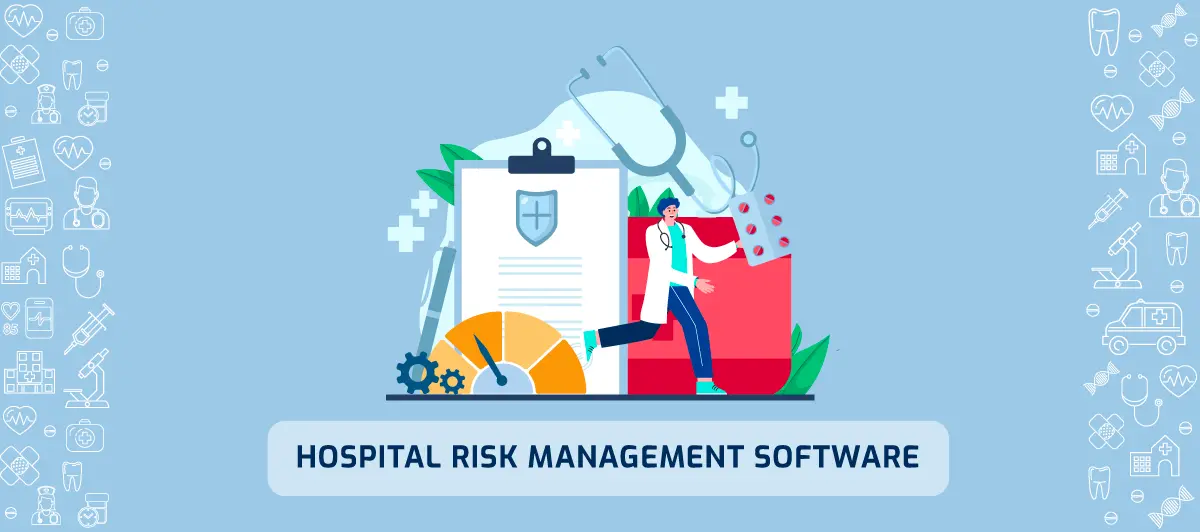Everything You Need To Know About Hospital Risk Management Software
Quick Summary: Hospital risk management software is a vital tool for healthcare institutions. It helps identify, assess, and mitigate risks to ensure patient safety and compliance. Hence this software streamlines reporting, analysis, and documentation of incidents, enhancing overall healthcare quality and safety.
Introduction
Healthcare, similarly to all other industries, should comply with government regulations. It won’t be false to mention that the healthcare industry is one of those governed by the most stringent laws. Hence, violating those will result in certain financial losses and worse consequences. The adverse events range from compensation for financial losses to even ending up in prison for violating laws.
These laws that are made for healthcare organizations are for good reason. They prevent healthcare organizations from certain unethical practices. At hospitals, the lives of people are at stake; hence, these organizations are majorly at risk of violating laws, be it unintentionally.
It is, therefore, necessary to have healthcare risk management in this industry to take corrective actions. Risk management in healthcare encompasses multiple clinical and administrative systems, practices, methods, and reports that detect, analyze, and avoid risks.
Risk management in the healthcare sector has become a huge issue, and you need a department that looks after it. Various development companies have started developing hospital risk management software that helps them deal with problems even before they happen.
It is a place where legal issues or rule violations could cost a hospital management a great loss, reputation damage. Hence, risk evaluation and risk management plan has become a necessary part of day-to-day operation for patient safety. This text will help you understand different aspects of risk management tools.
What is Hospital Risk management software?
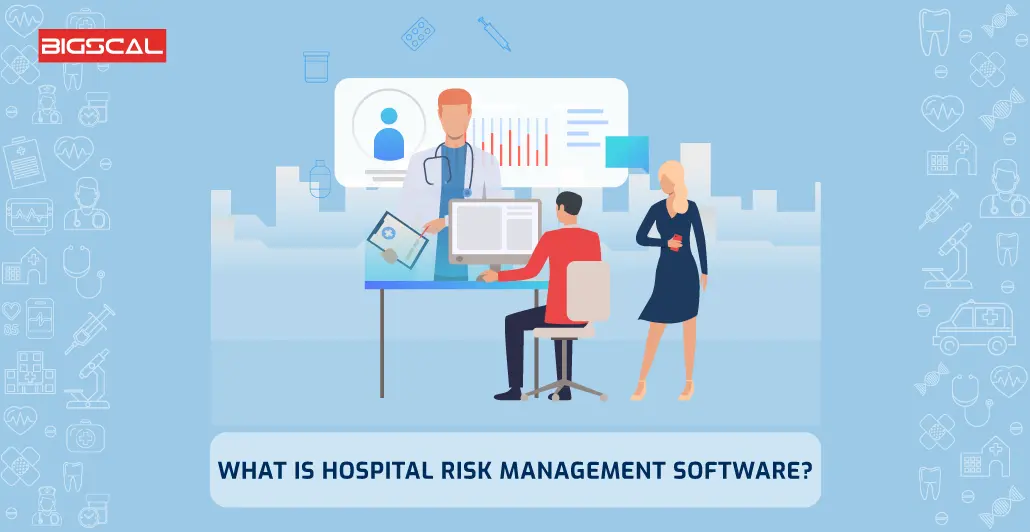
As a healthcare organization, do you have any strategic approach or method for addressing any medical errors at your place? It’s crucial to have such an approach. Hence, this is where Hospital risk management software comes into the picture. Using these risk management tools along with the right strategy can do wonders.
How do I go along with healthcare risk management software? No worries, this text will cover it all. Along with risk management tools, it’s necessary to understand what services hospitals provide article. Create your strategy to manage risk and operate the enterprise risk management tools accordingly.
Healthcare risk management would be easier when you are clear with your business objectives. It will help you identify the right technology that supports your needs. Once you are done choosing your suitable healthcare risk management tools, it will be very easy to identify even bigger risks and threats.
Having a successful risk management approach for the health system will need necessary security controls to ensure that you are aware of all high-risk threats. Hence, this will keep your important functions ongoing. Involving risk management software can help you develop a guideline for managing risks, which lets organizations become consistent in their approach to managing risk.
What are the features of healthcare risk management software?
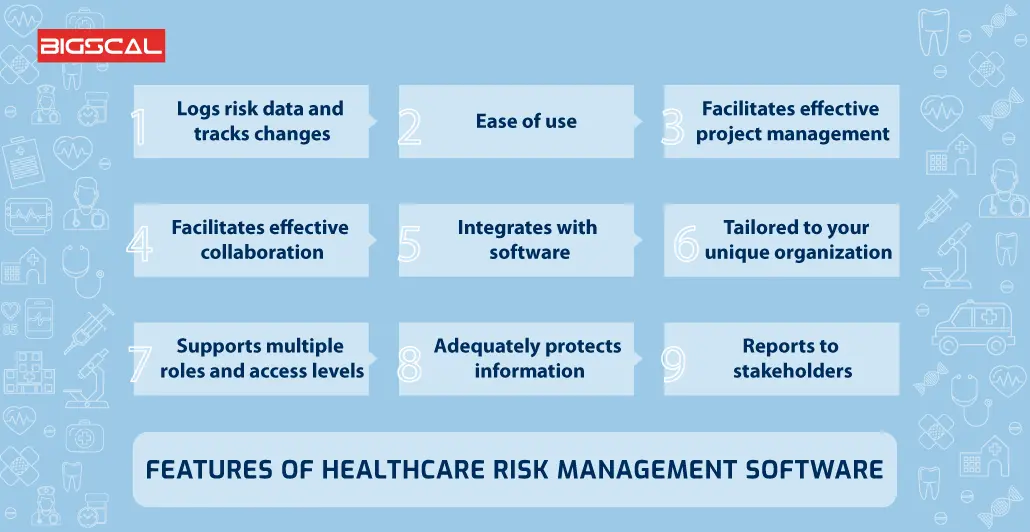
Logs risk data and tracks changes
The hospital risk management software that you choose must help you in documenting risks with factors like likelihood, tolerance, responses, and impact. The software must be capable enough to track, display, and record changes that are necessary for risk assessments over a span.
Ease of use
The process of developing a risk assessment report should be straightforward. Hence, it must be able to import lists of risks that already exist in bulk as a spreadsheet or create even one for new threat
Facilitates effective project management
The enterprise risk management software you choose must help in tracking and managing risks on a daily and continuous basis. It will help measure progress as per period that cannot even be done through spreadsheets.
Facilitates effective collaboration
Risk management is a process that needs a joint effort of healthcare providers and stakeholders both inside and outside healthcare institutions and organizations. Moreover the hospital risk management software must be able to support this effort with workflows like assessing risks, approving treatment, assigning tasks to a person, and developing a set of questions to determine the vendor’s profile.
Integrates with existing compliance management software
It’s of prime importance that you refrain from duplicating the efforts for risk management. Software that you choose as a risk management tool should help in identifying risks and avoiding controls. Therefore making a register for risks in the software that is useful to ensure compliance helps gather evidence to mitigate risk. Hence, this evidence will be helpful when there is an audit.
Tailored to your unique organization
Your healthcare risk management software must provide easy customization, such as creating different fields that can help you categorize risks per categories, teams, and regions. Moreover, it is necessary that the software is compatible with the model you want to use and that the risk calculation rules are adjustable to match the needs of the team.
Supports multiple roles and access levels
The information regarding risks is confidential. Hence, the risk manager software must help in requesting access to the data in the risk manager register. The hospital risk management software providers choose must support different roles and help you control access to the data appropriately.
Adequately protects information
If you are looking to get cloud-based risk management tools for medical devices for your healthcare organizations, vendors must use the right safeguards that protect data. Ensure that the software company has any security compliance certificates such as SOC 2 or ISO 27001 for added security.
Reports to stakeholders
Clinical and administrative systems should know about the risk profile and risk management tricks of their business. The software you must choose must facilitate better communication along with reporting to all the stakeholders. An ideal software might provide aids that can track risk over time, allow better identification of trends, and dig down all the specific areas with high risk.
Benefits of having risk management tools for healthcare organizations
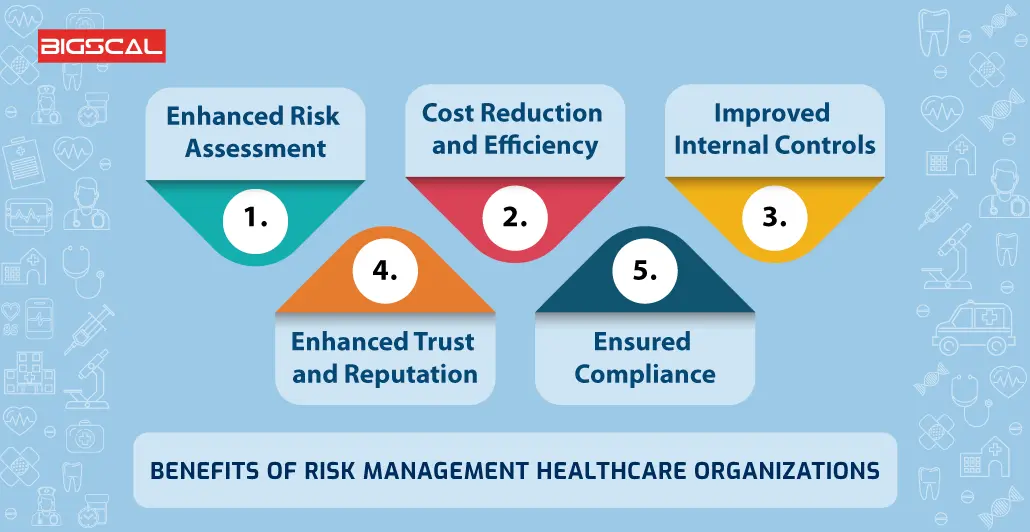
Hospital risk management software offers a range of valuable advantages to organizations seeking to avoid potential risks effectively. Here are some key benefits it brings to your safety culture:
- Enhanced Risk Assessment: Gain a precise understanding of the risks your organization faces, enabling informed decisions on which controls to implement.
- Cost Reduction and Efficiency: Integrate corporate governance, risk management, and compliance processes to lower costs and maximize operational efficiency.
- Improved Internal Controls: Strengthen your operations and internal controls by staying informed about the risk landscape and current mitigation efforts.
- Enhanced Trust and Reputation: Demonstrate a sophisticated approach to IT governance, building customer trust, improving brand reputation, and increasing shareholder value.
- Ensured Compliance: Drive compliance efforts to avoid violations, fines, litigation costs, and business disruptions, ensuring regulatory adherence.
Incorporating risk management software into your organization’s strategy empowers you to proactively address risks, streamline processes, reduce risk and bolster trust and compliance, ultimately contributing to the entire organization’ long-term succes
Top ways in which healthcare risk management software can enhance patient safety
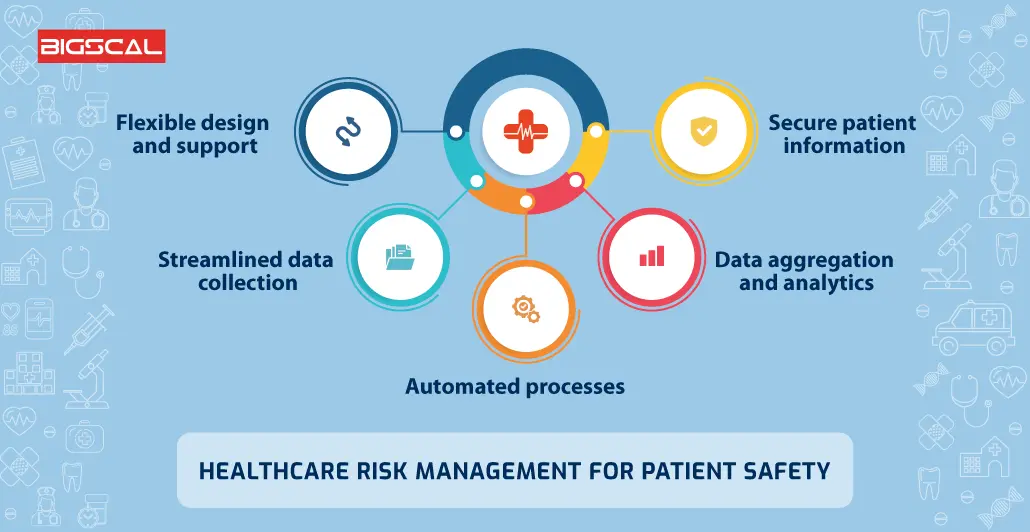
Flexible design and support
When you cannot identify the situation, it’s better to go with the flow. As per an article, the healthcare industry is dynamic and has ever-changing rules, legalities, and policies. Therefore, risk management has become a more complex aspect than before. This dynamic nature provides evidence of the industry’s uncertainty, which means you will need a solid yet flexible technology to support it.
Hence, hospital risk software management software transforms the strict laws and standards of the industry into a workflow for individuals to decide their roles in abiding by protocols. As regulations keep on changing inevitably, the system should be capable enough to adjust with the help of teams. It would reduce errors as the tasks are continuously updated, and data remains accounted for.
The technology is the right fit for your healthcare system, as per experts, when it can be used on a day-to-day basis and not only handle complex processes along with high configuration. Therefore the service team must be reliable, consistent, and on time, as clients might be using them on a regular basis.
Streamlined data collection
Before any organization starts creating a strategy for increasing patient safety, they will have to seek data. For effortless collection of data, it is necessary to make reporting methods as easy as possible. A study revealed that when there is unclear reporting, it was noticed that there were 86% instances of unreported events where the staff didn’t think it was reportable or reported, but not in this case.
However, having the right technology with data integration tools like data surveillance, patient safety event reporting, and enterprise-wide near-miss reporting might be helpful. It will provide clarity to what contributes to an incident and even simplify the data collection process.
Employees can easily identify incidents and unsafe conditions if they are given short and clear instructions. Along with a flexible risk management system, choose hospital policy management software that will help in reporting through any location or device that enhances reporting habits.
Also, in many cases, employees can anonymously conduct compliance reporting of the incidents and near misses without the fear of punishment and shame. Therefore it drives the number of people who want to report. Hence, this can help the healthcare industry avoid 86% chances of unreported events.
Automated processes and communication
Many healthcare organizations work with complex processes and poor communication. Healthcare risk management software, equipped with advanced technology, cuts through the complexity, bridging data and people for clear, direct and actionable data plans.
Firstly, the right software ensures consistent data collection and structures internal compliance processes. Accuracy is crucial, especially when dealing with events that are unexpected, resulting in patient harm. An excellent risk management plan promotes transparency and measured responses.
Automation of routine tasks de-burdens and alleviates therapist tasks. Fixed rules lower human mistakes, and regular spans of time which are automatically tracked keep employees on track. The software shifts this burden from the employees that have to simplify compliance and mitigate risks, thus allowing them to devote more energy and time to the patient care.
HRM software in healthcare clears ambiguities in healthcare processes. It increases data validity and lightens compliance. It therefore demands the bureaucracy needs and, accordingly, health providers would be able to do their best to consider patient health and patient results.
Data aggregation and healthcare analytics
Data collection is enriched and more automated routine tasks become an exception rather than a norm, allowing healthcare workers to expand their scope for more intensive analysis, risk stratification, and trend monitoring.
It was this strategy, which is depicted in the Prometheus Research paper titled Healthcare Quality Improvement Trends, that is based on the combination of big data and smart analytics. It allows predicting possible complications, readmissions, and care plan outcomes. Better patient health comes as a side effect, along with higher reimbursements and easier access to government regulations for those healthcare setups that face these issues.
Sifting through medical errors solely does not lead to any meaningful conclusions. For instance, an incident of medication error may reveal the problem, but, the analysis gets into the genesis of the what caused in.
It could show an overburdened staff or a drug that interferes with the medication that was given as a result of a medication mistake. It is essential to identify these lower prevalence main causes for active preventive measures to be adopted and for a preparedness culture to be in place, a were the lives of the patients are very importantly kept safe.
The right healthcare risk management tool is to make the abstruse input information valuable for patients. Further, employing health data analytics is the most expeditious way of finding the inconspicuous elements which are on a grander spectrum that is used for formulating strategies that will lead to improved results. The use of this preventive measure assures proper utilization of the data gained and thus effective patient quality and further healthcare outcome improvement.
Secure patient information
These days, the healthcare systems not only struggle with the increasing cyber threats which jeopardize the patient’s safety and care quality, but they face the emerging problems as well. Enterprise risk management software in the cloudgrounds out as an effective solution for this bottleneck. Besides skyrocketing the security of patient data from cyber threats, it also enables the creation of a dedicated place where only authorized people can access, preventing issues that emanate from the carelessness of the email system.
Systems that worked for companies in the past can now prove to be a great risk factor. These are the ones lacking updated support and protection measures making them a favorite target that hackers will not miss. They are old systems; consequently they are not getting enough updates and glitches. In the end, it means that these systems become vulnerable and they get easily hacked. So, with time, threats are becoming more complex, and technological security must change as well, delivering the role-based authorization and staying on the agenda for vendors.
In a nutshell, the healthcare sector is being exposed to cyber attacks, which requires the responding entities to take the necessary measures to prevent the risks. As a result, cloud-based risk management software and highlighting the requirement to bring forward legacy systems are critical steps in preventing data security breaches and data protection, and ensure the patient care come to the top of healthcare organization priority list.
How Bigscal’s Risk Management Software Solution Supports Your Business?
That is where one comes into the picture: Bigscal’s Risk Management Software System is a unique tool which would strengthen your business in terms of risk management. The made-in-our-shop software solution for hospital management is the panacea for crisis management enabling you to identify, assess and manage risks quickly and efficiently.
Finally, you will be able to retrieve instantaneous data analysis and reports to make a sensible and effective risk minimizing decisions. We craft a solution according to your definite repose sector, hence it fits your firm flows.
In other words, no variance from the sector, be it healthcare, finance, or any other, is out of all range given that the product robustly shares compliances, diminishes industrial vulnerabilities, and overall ends up as resilient businesses. Trust us to ensure the safety of your business operations and facilitate your growth process with a multifaceted risk management software tool.
Conclusion
In conclusion, Hospital Risk Management Software is a vital tool for modern healthcare institutions to prevent medical errors. It helps hospitals and healthcare organizations identify and mitigate risks, ensuring the safety of patients and the efficiency of operations. Moreover it streamlines processes, tracks incidents, and ensures compliance with regulations.
By implementing such software, hospitals can enhance patient care, improve outcomes, reduce costly errors and medical liability, and protect their reputation. It simplifies data management, making it easier for staff to analyze trends and make informed decisions. Hence in today’s healthcare landscape, where safety and quality are paramount, hospital risk management software is not just a luxury but a necessity.
Remember, choosing the right software that fits your hospital’s needs is crucial. It should be user-friendly, adaptable, and compliant with industry standards. Investing in this technology is an investment in the well-being of both patients and the hospital’s overall success. Therefore, don’t hesitate to explore your options and make a smart choice for a safer and more efficient healthcare environment.
FAQ
What is the risk management system in a hospital
The hospital risk management software is a structured approach to identify, assess, and mitigate potential risks to the organization’s assets to ensure patient safety, regulatory compliance, and efficient operations.
What are risk assessment tools in hospitals?
Risk assessment tools in a hospital include software applications and protocols that help healthcare professionals evaluate and prioritize risks, such as patient safety incidents, compliance violations, or clinical errors.
Which software is best for risk analysis?
The best software for risk analysis depends on your specific needs and industry. Popular options include Enterprise Risk Management (ERM) software, Risk Assessment Software, and Compliance Management Software tailored to different sectors.
What are the 5 types of risk assessment?
The five types of risk assessment include Strategic Risk Assessment, Operational Risk Assessment, Financial Risk Assessment, Compliance Risk Assessment, and Hazard Risk Assessment.
What are the 3 principles of risk assessment?
The three key principles of risk assessment are the Identification of Hazards, Assessment of Risks, and Implementation of Control Measures to mitigate those risks.
